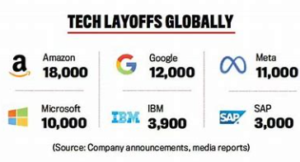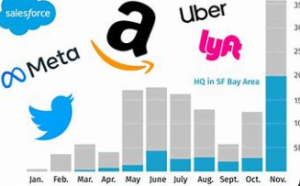He candidly discussed corporate layoffs, the benefits of leaner operations, and his views on the Apple Vision Pro. He also expressed his concerns about the potential risks of artificial intelligence, offering a balanced, human-centric perspective on these complex issues.
The tech industry has been sailing through a sea of change, with around 40,000 employees from 157 companies facing layoffs in just two months. Mark Zuckerberg, the CEO of Meta, recently offered his perspective on this trend. He highlighted that many companies are still adjusting to the post-pandemic world. The e-commerce boom during the pandemic led to an overbuilding and overhiring spree. As the world started returning to normalcy, companies found themselves grappling with an oversized workforce, leading to job cuts.
Shift Towards a Leaner Structure
Zuckerberg pointed out that companies are now recognizing the advantages of being ‘leaner’. This realization was a significant factor behind Meta’s layoffs last year. The drive for efficiency has been at the heart of the recent wave of tech layoffs.
Zuckerberg acknowledged that overhiring during the e-commerce boom was a significant factor in the current layoffs. Companies hired more employees than necessary during this period, leading to an excess of staff as the boom subsided. Even though letting go of talented folks was tough during the first round of layoffs, he believes that being more efficient is helping companies get back on track.
AI’s Role in Layoffs: Not the Primary Factor
When questioned about the impact of AI on jobs and the job market, Zuckerberg clarified that AI was not a major catalyst for Meta’s decisions. He believes that while some tech companies may have restructured to invest more in AI, it wasn’t the primary factor for Meta.
Zuckerberg also shared his thoughts on OpenAI CEO Sam Altman’s ambitious $7 trillion chip venture aimed at fueling AI developments. He acknowledged that AI might have played a minor role in layoffs at some companies, but he largely attributes the layoffs to overbuilding during the pandemic and the subsequent rightsizing efforts across the tech industry.
Tech Layoffs: A Human Perspective
In recent times, the tech industry has been navigating turbulent waters with several big companies announcing significant layoffs. Meta, Facebook’s parent company, is reportedly planning a wave of layoffs as part of its long-term downsizing efforts, which will eventually see 10,000 jobs being cut. This move is part of a strategy termed as the “year of efficiency”.
Similarly, Google and Microsoft have announced plans to let go of 12,000 and 10,000 employees respectively. Amazon, too, has initiated a new round of layoffs, which will result in the largest personnel decrease in the E-retailer’s 28-year history, leading to more than 18,000 job losses.
These layoffs are part of a larger strategy to streamline operations and increase efficiency. As the tech industry continues to evolve, it will be intriguing to see how these changes shape the future of these companies. Behind every layoff statistic is a human story, and as these companies navigate these changes, the focus should also be on supporting the affected employees during these challenging times.
Drive for Efficiency Through Streamlining
Many companies are exploring ways to restructure, streamline management levels, and shift towards a more efficient model. Even with strong earnings, companies like Microsoft and Google continue downsizing. CEOs at firms like Amazon have expressed intentions to restructure and invest in AI-related areas.
Transforming Tech Industry
In conclusion, the tech industry is undergoing a significant transformation. While the layoffs are indeed painful, they seem to be a part of a larger strategy to streamline operations and increase efficiency. As the industry continues to evolve, it will be interesting to see how these changes shape the future of tech companies. The human element in this transformation is crucial, as companies navigate these changes while striving to support their employees during these challenging times.












Comments 1